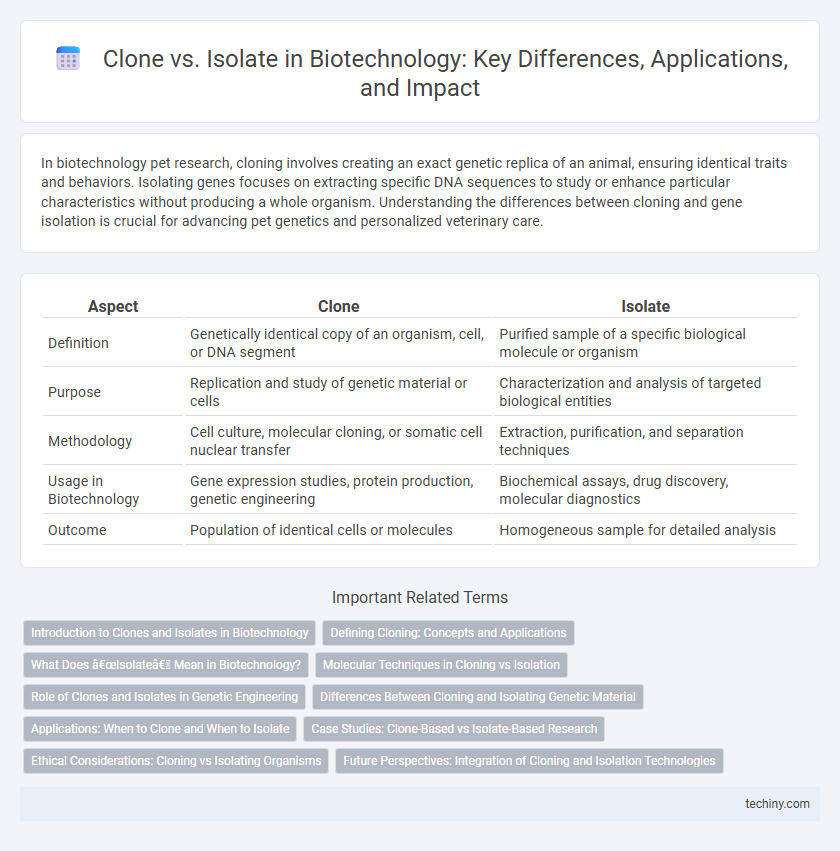In biotechnology pet research, cloning involves creating an exact genetic replica of an animal, ensuring identical traits and behaviors. Isolating genes focuses on extracting specific DNA sequences to study or enhance particular characteristics without producing a whole organism. Understanding the differences between cloning and gene isolation is crucial for advancing pet genetics and personalized veterinary care.
Table of Comparison
| Aspect | Clone | Isolate |
|---|---|---|
| Definition | Genetically identical copy of an organism, cell, or DNA segment | Purified sample of a specific biological molecule or organism |
| Purpose | Replication and study of genetic material or cells | Characterization and analysis of targeted biological entities |
| Methodology | Cell culture, molecular cloning, or somatic cell nuclear transfer | Extraction, purification, and separation techniques |
| Usage in Biotechnology | Gene expression studies, protein production, genetic engineering | Biochemical assays, drug discovery, molecular diagnostics |
| Outcome | Population of identical cells or molecules | Homogeneous sample for detailed analysis |
Introduction to Clones and Isolates in Biotechnology
Clones in biotechnology refer to genetically identical copies of an organism or cell, created through processes like somatic cell nuclear transfer or molecular cloning. Isolates describe distinct strains or genetic variants obtained from a population, often characterized by unique genetic or phenotypic traits crucial for research and development. Both clones and isolates play essential roles in genetic studies, pharmaceutical production, and agricultural biotechnology innovations.
Defining Cloning: Concepts and Applications
Cloning in biotechnology refers to creating genetically identical copies of a DNA sequence, cell, or organism using molecular techniques such as PCR or recombinant DNA technology. It enables researchers to amplify specific genes for further study, therapeutic development, or agricultural improvements. Applications of cloning include gene expression analysis, production of genetically modified organisms, and regeneration of tissues for regenerative medicine.
What Does “Isolate” Mean in Biotechnology?
In biotechnology, "isolate" refers to the process of obtaining a specific gene, protein, or microorganism from a complex mixture, ensuring its purity and identity for further study or application. Unlike cloning, which involves producing identical copies of an organism or gene, isolation focuses on separating and characterizing the target molecule or organism in its natural form. Isolates are critical for research, diagnostics, and the development of biotechnological products, as they provide the foundational material for genetic analysis and manipulation.
Molecular Techniques in Cloning vs Isolation
Molecular techniques in cloning typically involve recombinant DNA technology, where specific DNA fragments are inserted into vectors to produce genetically identical copies, enabling amplification and functional analysis of target genes. Isolation methods focus on extracting pure DNA, RNA, or proteins from complex biological samples using techniques such as centrifugation, electrophoresis, and affinity purification to study native molecules without altering their sequence. Cloning facilitates gene manipulation and expression studies, while isolation preserves molecular integrity for characterization and downstream applications.
Role of Clones and Isolates in Genetic Engineering
Clones serve as identical genetic replicas essential for producing uniform biological materials in genetic engineering, enabling precise study and manipulation of specific genes. Isolates represent distinct genetic variants or microbial strains isolated from natural sources, providing a diverse genetic pool for developing novel traits or bioproducts. The interplay between clones and isolates underpins advancements in gene editing, synthetic biology, and recombinant DNA technologies by combining uniformity with genetic diversity.
Differences Between Cloning and Isolating Genetic Material
Cloning genetic material involves creating identical copies of a specific DNA sequence or organism, resulting in genetically uniform replicas, while isolating genetic material refers to extracting and purifying DNA or RNA from cells without replication. Cloning produces a proliferative set of genetic copies used for gene expression or therapeutic purposes, whereas isolation provides the raw material necessary for further genetic analysis or manipulation. The primary difference lies in cloning's synthetic reproduction versus isolation's singular extraction of genetic sequences.
Applications: When to Clone and When to Isolate
Cloning is ideal for applications requiring the replication of specific genes or organisms to produce genetically identical copies for research, pharmaceutical development, and agricultural improvements. Isolation is preferred when the goal is to obtain pure samples of cells, proteins, or microorganisms for diagnostic, biochemical analysis, or therapeutic purposes. Selecting between cloning and isolating depends on whether the objective is amplification of genetic material or extraction of a distinct biological entity for detailed study.
Case Studies: Clone-Based vs Isolate-Based Research
Clone-based research leverages genetically identical organisms to ensure reproducibility and precise genetic manipulation, as demonstrated in case studies involving transgenic mice for disease modeling. Isolate-based research utilizes distinct microbial or cellular strains, highlighting functional diversity in pharmaceutical bioprospecting, such as antibiotic discovery from novel bacterial isolates. Comparative case studies reveal clone-based methods excel in controlled genetic analysis, while isolate-based approaches drive the identification of unique bioactive compounds with therapeutic potential.
Ethical Considerations: Cloning vs Isolating Organisms
Cloning raises significant ethical concerns due to the potential for genetic uniformity, loss of biodiversity, and the moral implications of creating genetically identical organisms. Isolating organisms, by contrast, involves extracting and studying individual species or genes without altering their genetic makeup, posing fewer ethical dilemmas and maintaining natural genetic diversity. Ethical debates surrounding cloning often emphasize the risks of reduced ecosystem resilience and challenges related to identity and individuality, whereas isolating techniques are generally viewed as essential tools for scientific research and conservation efforts.
Future Perspectives: Integration of Cloning and Isolation Technologies
Integration of cloning and isolation technologies is poised to revolutionize biotechnology by enabling precise genetic manipulation alongside the extraction of pure biological samples. Advanced methods such as CRISPR-based cloning combined with single-cell isolation are accelerating gene function studies and personalized medicine. Future perspectives emphasize seamless workflows that enhance throughput, accuracy, and scalability for applications in drug discovery, synthetic biology, and regenerative therapies.
Clone vs Isolate Infographic

 techiny.com
techiny.com